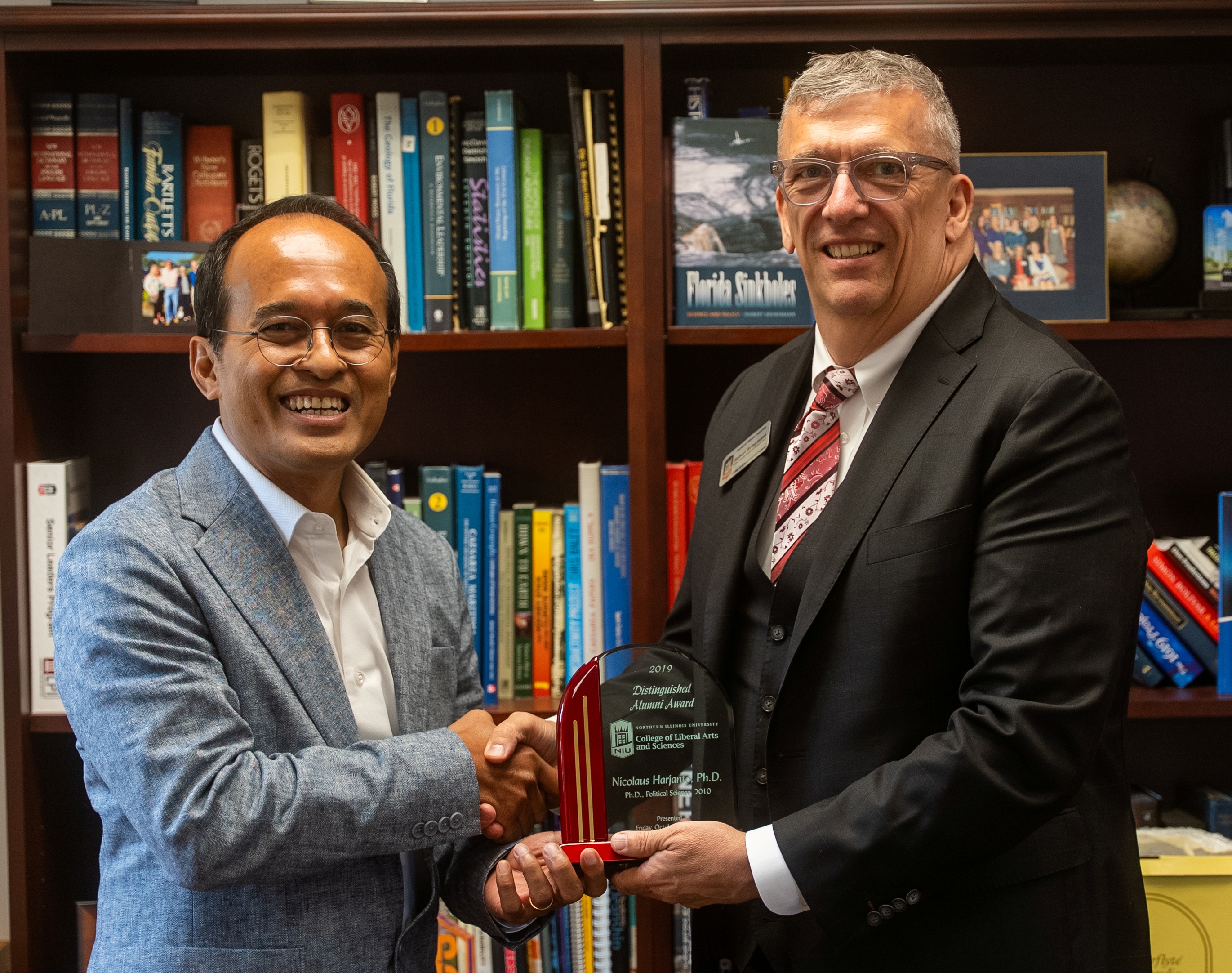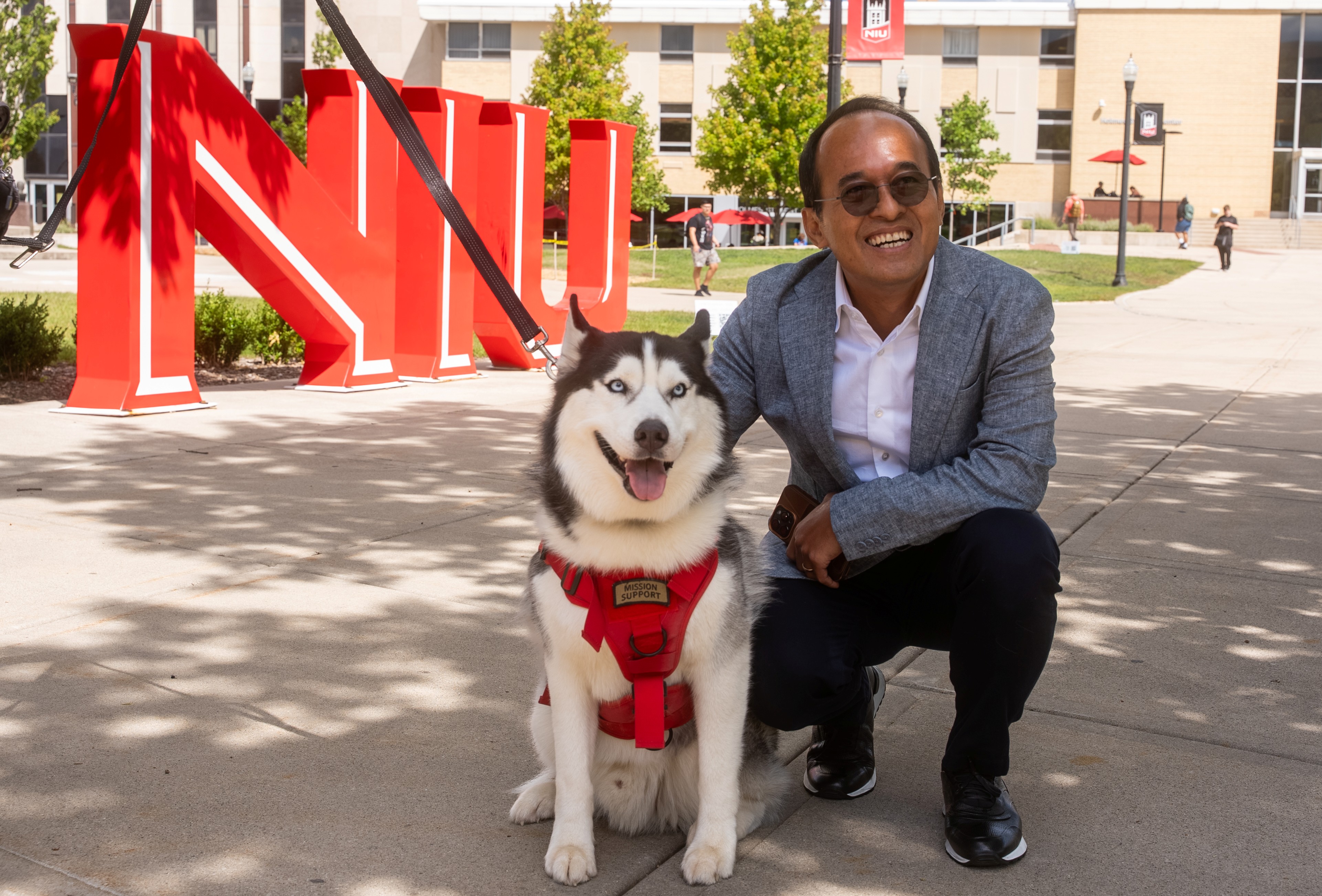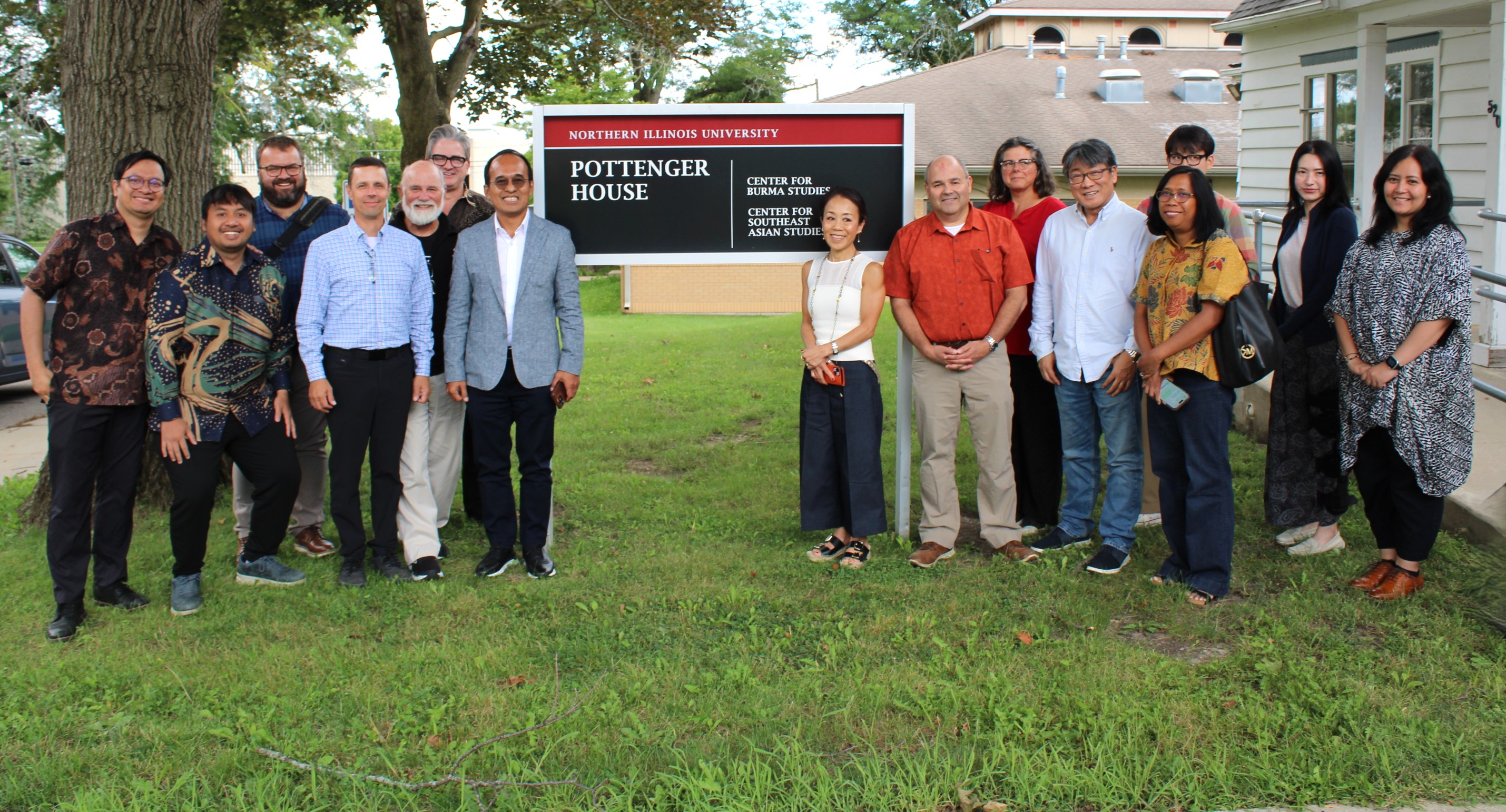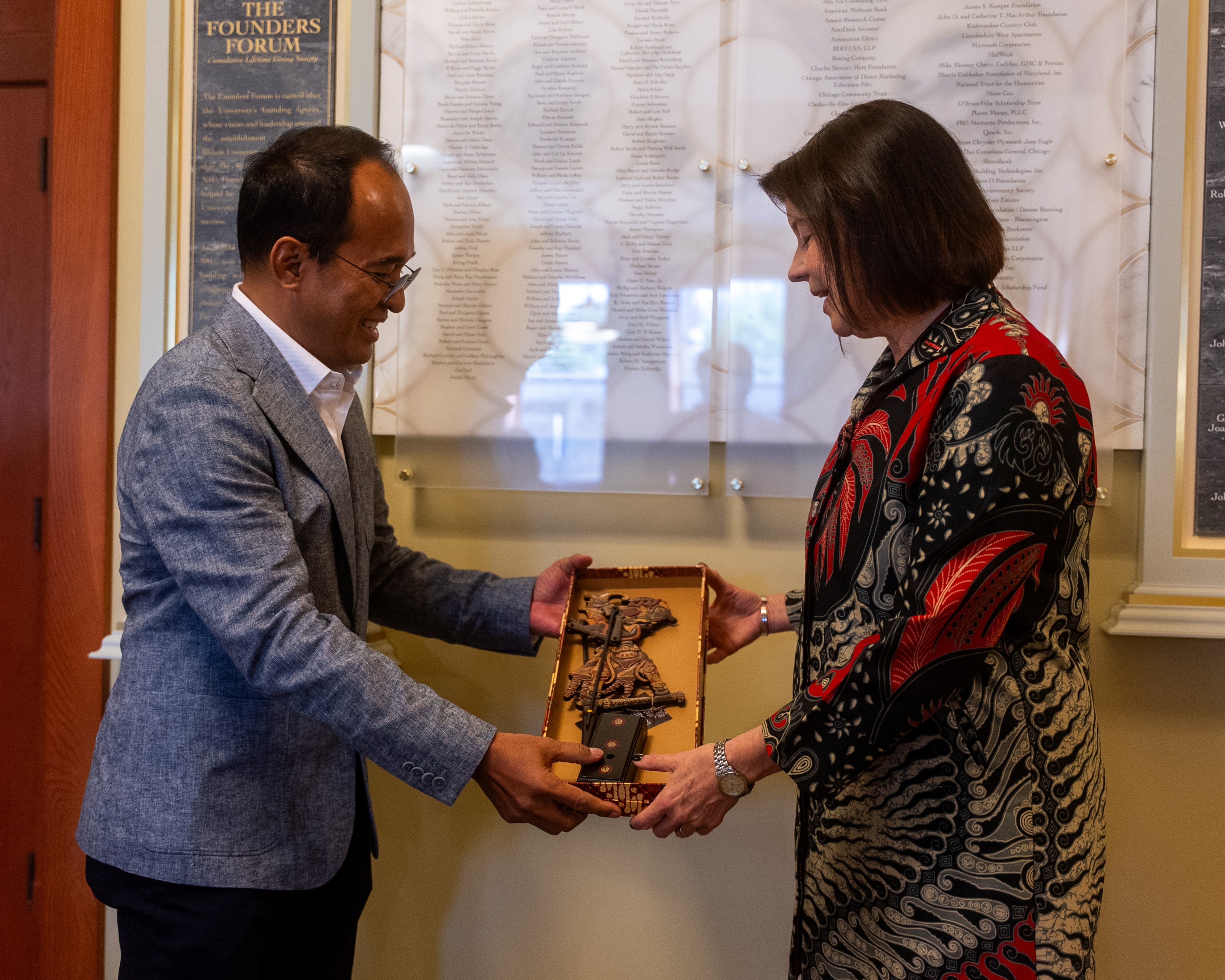Insights for Indonesia: Nicolaus "Nico" Harjanto, Ph.D. '10
By Lia Kizilbash Gillet


Top: Nicolaus “Nico” Harjanto, Ph.D. ’10, shakes hands with College of Liberal Arts and Sciences Dean Robert Brinkmann while holding the Distinguished Alumni Award he was honored with in 2019. Bottom: Harjanto poses with Mission III outside of the NIU Holmes Student Center. (Photo credit: NIU)
When Nicolaus “Nico” Harjanto, Ph.D. ’10, special staff to the Vice President of the Republic of Indonesia, first stepped onto NIU’s campus, he was struck by a quiet but powerful affirmation—his undergraduate thesis on Indonesian politics was sitting on a library shelf in the Southeast Asia section of Founders Memorial Library.
That moment, paired with a doctoral assistantship and a welcoming academic community, sealed his decision to pursue a Ph.D. in political science at NIU.
Harjanto had already earned a master’s degree in political science from Ohio University, but NIU’s dedicated Southeast Asian studies program—and its renowned faculty—offered something more.
“I knew there were several big names in the academic field of Southeast Asian politics at NIU,” he said. “When I met Professor Dwight King, he gave me a campus tour. He was so friendly, so helpful, and we started to build a mutual trust very quickly.”
King, who died in 2015, was a member of the NIU faculty for 32 years and was internationally known in academic and governmental arenas as a scholar and expert on Indonesia. He served as director of the Department of Political Science's graduate studies program and as director of the Center for Southeast Asian Studies.
Immersed in Community, Grounded in Purpose
During his seven-year journey at NIU, Harjanto immersed himself in campus life. He said he “quickly drank the water from the Kishwaukee River,” a lighthearted way of saying he embraced NIU. Far from his Jakarta home, he found family among faculty and friends, playing badminton, attending church, and spending long nights at the Junction Eating Place, drawn by its 24-hour access and bottomless coffee.
NIU offered more than comfort and camaraderie. Its academic rigor, faculty and mentorship shaped Harjanto’s commitment to strengthening democracy in Indonesia. After earning his Ph.D. and returning home, the lessons learned at NIU became the foundation for applying research to real-world politics.
From Research to Real-World Impact
In 2011, as Jakarta’s provincial election approached, Joko Widodo (widely referred to as Jokowi) was preparing to challenge incumbent governor Fauzi Bowo, who had strong backing; Jokowi’s odds were slim. Harjanto applied the qualitative and quantitative methodologies he had mastered at NIU to conduct surveys and analyze data, assessing voter sentiment and identifying strategic opportunities. Working through a research initiative he was beginning to shape—one that would later evolve into a formal institute—Harjanto said the findings helped shift the narrative, convincing business leaders and voters that Jokowi had a viable path to victory. In 2012, Jokowi won.
Following the election, in June 2012, Harjanto formally launched the Populi Center, a non-profit research institute focused on public opinion and policy studies. At the time, he noted that Indonesia’s political landscape was flooded with unreliable political consultants who manipulated data to sway public opinion. He hoped to help foster a more transparent and informed democratic process.
When Jokowi pursued the presidency in 2014, Harjanto again played a role, crafting a political roadmap using data-driven insights to identify key societal segments and public sentiments that Jokowi needed to engage. Jokowi won as the first Indonesian president who was not from the political or military elite.

Harjanto credits his methodology and rigorous quality control with earning the trust of the business community, which needed updated insights into the political landscape to make more informed decisions about allocating political donations.
“Elections are very costly,” he said. “They [candidates] will ask businesses for financial support. Many businesses feel compelled to contribute, concerned about the potential consequences of declining support for a candidate who ultimately wins.”
Through the Populi Center, Harjanto also aims to make democracy less costly.
“Maybe in the past there were three or four candidates, and you had to give to each, but if you have good data about political preference, you know who is likely to win,” he said. “You know the trend, so just give more to one [candidate]. We can also convince the other candidates that they don’t have a chance to win, and not waste resources on a losing effort. Of course, if we know there is one very good candidate, we can ask the political donors and voters to support the best candidate based on our political preference data. In the Populi Center, we want to uphold and voice public preferences, including those of the silent majority.”
Guided by Integrity
Today, in addition to his role as chairman of the Populi Center, Harjanto serves as a special staff to the Vice President of the Republic of Indonesia, Gibran Rakabuming Raka.
“The role of special staff is to assist the Vice President to fulfill his duty,” Harjanto said. “It could be anything related to monitoring and evaluating government priority programs, proposing new initiatives or assisting with the delivery of the VP's social assistance.”
His role is flexible and fast-paced, allowing him to respond to urgent issues or questions outside the constraints of bureaucracy. He is one of a handful of appointed special staff members who help gather timely information when the Vice President needs it the most.
Previously, Harjanto held roles as commissioner for PT Bank Rakyat Indonesia and PT Mineral Industri Indonesia, and as special staff for political communication and institutions to the Minister of State Secretariat of the Republic of Indonesia. Throughout his career, he has drawn on the wisdom of NIU mentors—Professors King, Daniel “Danny” Unger, Gregory Schmidt and Irene Rubin—whose teachings on integrity continue to guide him.
 Nicolaus “Nico” Harjanto, Ph.D. ’10, presents NIU President Lisa C. Freeman with a gift from Indonesia. (Photo credit: NIU)
Nicolaus “Nico” Harjanto, Ph.D. ’10, presents NIU President Lisa C. Freeman with a gift from Indonesia. (Photo credit: NIU)“We have to walk the talk,” Harjanto said. “My position requires mutual trust. We have to be as genuine as possible at all levels, regardless of our education, degree, or political networks.”
Giving Back to Move Forward
In gratitude, Harjanto contributes to the Dwight Y. King Endowment in the Center for Southeast Asian Studies, which supports NIU graduate students who are pursuing substantial study or research related to Indonesia.
“I believe in the cycle of life,” he said. “There was a time when I received a lot from NIU—an assistantship and support from the Center—so this is a time for me to give back with my ability, my capacity.”
He remembers Professor King as humble and wise, often sharing lessons through stories rather than direct advice.
“From those stories, I saw the importance of developing the values of respect, being on time, being modest and being a good listener. I think one time he said, ‘A good leader is a good listener.’”
Harjanto hopes the Center for Southeast Asian Studies will continue to produce quality scholars, expanding its reach across Southeast Asia and bringing new energy to regional democracies. Still, he believes the Center’s reputation has already left a lasting mark on Indonesia’s political development.
“In the late 90s, after the fall of the authoritarian regime, there were so many political scientists who graduated from NIU in Indonesia,” he said. “They became part of the government teams that formulated political party laws, election laws, and legislative frameworks.”
From a thesis on a library shelf to helping shape Indonesia’s democratic future, Harjanto is part of that legacy. Through his public service, research, and support of the Dwight Y. King Endowment, he is helping ensure that NIU’s impact continues to echo across Southeast Asia.
To help inspire discovery and empower student success at NIU, visit niuforward.com.
